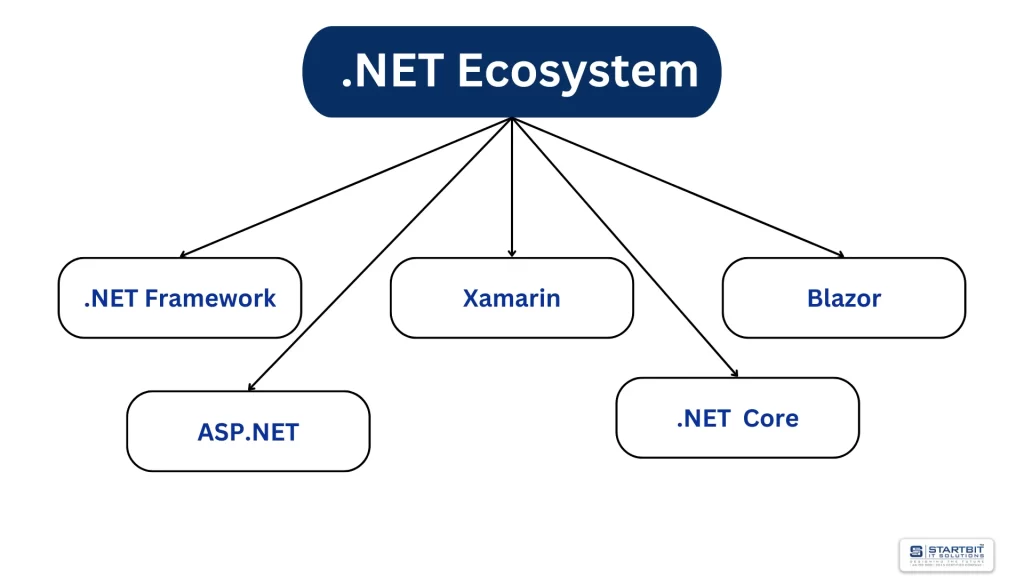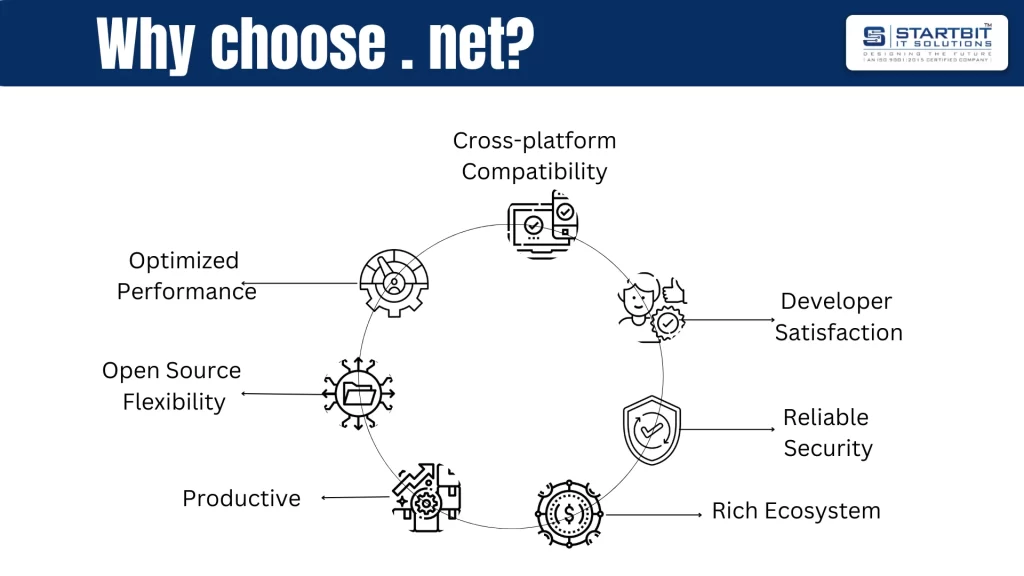
In today’s fast-paced digital world, choosing the right platform for web development is crucial to the success of any project. With numerous options available, the .NET platform stands out as a comprehensive, versatile, and powerful framework. This article delves into why choosing a .NET platform for your web development.
What is .dot net?
.NET is a free, open-source development platform created by Microsoft. It supports building applications for various environments, including web, desktop, mobile, gaming, and IoT. .NET offers a unified platform for building applications with consistent runtime behaviors and comprehensive libraries.
.
The Key Components of .NET Ecosystem:
.NET Framework:
The .NET Framework is a mature and stable platform used for developing and running applications on Windows. It includes a large class library called the Framework Class Library (FCL) and provides language interoperability across several programming languages. The .NET Framework is integral for enterprise-level applications, Windows services, and web applications hosted on IIS.
.NET Core:
.NET Core is a modular, high-performance, cross-platform framework. It allows developers to create applications that can run on multiple operating systems. .NET Core is known for its performance, scalability, and microservices architecture support. It is the foundation for ASP.NET Core, which is used for building modern web applications and APIs.
Xamarin:
Xamarin extends the .NET ecosystem to mobile app development. By using Xamarin, developers can write shared code in C# for Android and iOS applications, thus reducing development time and costs. Xamarin also provides access to native APIs, ensuring that the applications perform as well as native apps.
ASP.NET and ASP.NET Core:
ASP.NET is a framework for building dynamic web applications. It offers powerful tools and libraries for web development, including MVC (Model-View-Controller) architecture, Razor pages, and Web APIs. ASP.NET Core is the cross-platform version of ASP.NET, designed to be fast, lightweight, and modular. It is optimized for cloud and microservices applications.
Blazor:
Blazor is an exciting addition to the .NET ecosystem that allows developers to build interactive web applications using C# and .NET instead of JavaScript. Blazor can run on the client side in the browser using WebAssembly or on the server side in ASP.NET Core.

.
Why choose the dot net?
.NET is a versatile and robust framework that has gained significant popularity in the realm of web application development for several compelling reasons:
- Productive: Accelerates development with robust frameworks and extensive libraries, streamlining the coding process.
- Cross-platform Compatibility: Enables development for various platforms, ensuring seamless user experience across different devices.
- Developer Satisfaction: Highly preferred by developers due to its user-friendly tools, documentation, and community support.
- Optimized Performance: Provides optimal performance in critical areas, enhancing the overall responsiveness and efficiency of web applications.
- Reliable Security: Offers trusted security features and protocols, safeguarding applications against potential threats and vulnerabilities.
- Rich Ecosystem: Boasts a vast ecosystem of tools, plugins, and resources, facilitating scalability and customization as per project requirements.
- Open Source Flexibility: Leverages the advantages of being open source, fostering collaboration, innovation, and continuous improvement within the development community.

.
What types of projects are best for .Net?
NET is versatile, so it suits various projects. Here are some prime candidates:
Web Applications: ASP.NET makes web development efficient, scalable, and secure. It’s ideal for anything from small business sites to large enterprise applications.
Desktop Applications: With frameworks like WPF and WinForms, .NET is great for building desktop apps. These could be anything from productivity tools to complex software.
Mobile Apps: Xamarin allows you to create cross-platform mobile apps using .NET, sharing a significant portion of the codebase between iOS and Android versions.
Cloud Services: Azure integrates seamlessly with .NET, making it a solid choice for developing cloud-based applications, including microservices, serverless functions, and APIs.
Game Development: Unity, a popular game development platform, uses C# (a .NET language) extensively, making .NET a strong choice for game development.
IoT Applications: .NET Core and .NET Nano can be used for building Internet of Things (IoT) solutions, connecting devices, and processing data securely.
Machine Learning: ML.NET, a framework within .NET, allows you to integrate machine learning models into your applications without needing expertise in other ML frameworks.
Enterprise Solutions: .NET is well-suited for building enterprise-scale applications due to its strong support for scalability, security, and integration with various systems.
.
.
Tips to Choose the Right .Net Development Company:
Evaluate Experience and Expertise: Look for a company that has a strong track record of developing .NET applications. Check their portfolio, client testimonials, and case studies to gauge their experience and expertise in .NET development.
Check Technologies and Tools: Ensure that the company is up-to-date with the latest technologies and tools related to .NET development. They should be proficient in using frameworks like ASP.NET, .NET Core, and have experience with related tools like Visual Studio, Azure DevOps, etc.
Assess Team Skills: Evaluate the skills of the development team. They should have expertise in .NET programming languages (C#, VB.NET), databases (SQL Server, MySQL), web development (HTML, CSS, JavaScript), and other relevant technologies.
Understand Project Management Approach: Inquire about their project management methodologies. A reliable company will follow agile or similar methodologies to ensure timely delivery, regular updates, and flexibility in project requirements.
Communication and Support: Effective communication is crucial for successful project delivery. Ensure that the company has clear communication channels and offers regular updates on the project progress. Also, inquire about post-development support and maintenance services.
Quality Assurance Practices: Check their quality assurance (QA) practices. The company should have a robust testing process in place to ensure bug-free, high-quality software development.
Scalability and Flexibility: Consider the scalability and flexibility of the company in handling your project requirements. They should be able to scale resources based on project needs and adapt to changing requirements during the development process.
Cost and Budgeting: While cost is important, it shouldn’t be the sole deciding factor. Compare pricing models, but prioritize value and quality over low costs. A company that offers competitive pricing with a strong portfolio and expertise is a better choice.
Client References and Reviews: Ask for client references or look for reviews/testimonials from their previous clients. This will give you insights into their reputation, reliability, and client satisfaction levels.
Legal and Contractual Aspects: Ensure that you have a clear understanding of the legal and contractual aspects before starting the project. This includes project timelines, deliverables, payment terms, intellectual property rights, etc.
.
.
Conclusion:
In the realm of web development, Startbit IT Solutions stands out as a premier choice for leveraging the power and versatility of the .NET platform. With a deep understanding of the .NET ecosystem and a track record of delivering exceptional solutions, Startbit IT Solutions offers a comprehensive range of services tailored to meet diverse project requirements.
Their expertise spans across various domains, including web applications, desktop applications, mobile apps, cloud services, game development, IT solutions, machine learning integrations, and enterprise-scale applications. By harnessing the capabilities of .NET Framework, .NET Core, Xamarin, ASP.NET, Blazor, and other cutting-edge technologies, Startbit IT Solutions ensures optimal performance, scalability, security, and customization for every project they undertake.
Moreover, Startbit IT Solutions excels in project management, communication, quality assurance, and post-development support, ensuring a seamless and satisfying experience for their clients. With a focus on delivering value-driven solutions while maintaining cost-effectiveness, Startbit IT Solutions emerges as a trusted partner for businesses looking to innovate and thrive in today’s digital landscape.
.
.
FAQ:
A: .NET Framework is primarily for Windows applications, while .NET Core is cross-platform and can run on Windows, macOS, and Linux. .NET Core is also more modular and optimized for modern development practices.
A: Yes, you can use Xamarin, a part of the .NET ecosystem, for mobile app development. Xamarin allows you to write shared code in C# for Android, iOS, and Windows apps, saving time and effort in development.
A: .NET is suitable for businesses of all sizes. ASP.NET, for example, is efficient and scalable, making it ideal for small business websites as well as large enterprise applications.
A: Some popular tools and frameworks include ASP.NET Core for web development, Xamarin for mobile app development, Entity Framework for data access, and Visual Studio for integrated development environment (IDE).
A: .NET provides built-in security features such as code access security, authentication, authorization, and encryption. It also has security libraries and best practices to help developers build secure applications.
A: Yes, ML.NET is a framework within .NET that allows you to integrate machine learning models into your applications. It provides APIs for training and deploying ML models without needing expertise in other ML frameworks.
A: Blazor allows you to write client-side web applications using C# and dot NET, reducing the need for JavaScript in certain scenarios. However, JavaScript is still commonly used in web development, especially for complex front-end functionalities.
A: Factors to consider include the company’s experience with dot NET development, expertise in relevant technologies and tools, team skills, project management approach, communication and support, quality assurance practices, scalability, flexibility, pricing, client references, and legal aspects.
A: Yes, .NET applications can be deployed on cloud platforms like Microsoft Azure, AWS, and Google Cloud Platform. dot NET Core is particularly well-suited for cloud-based applications due to its cross-platform compatibility and scalability.


